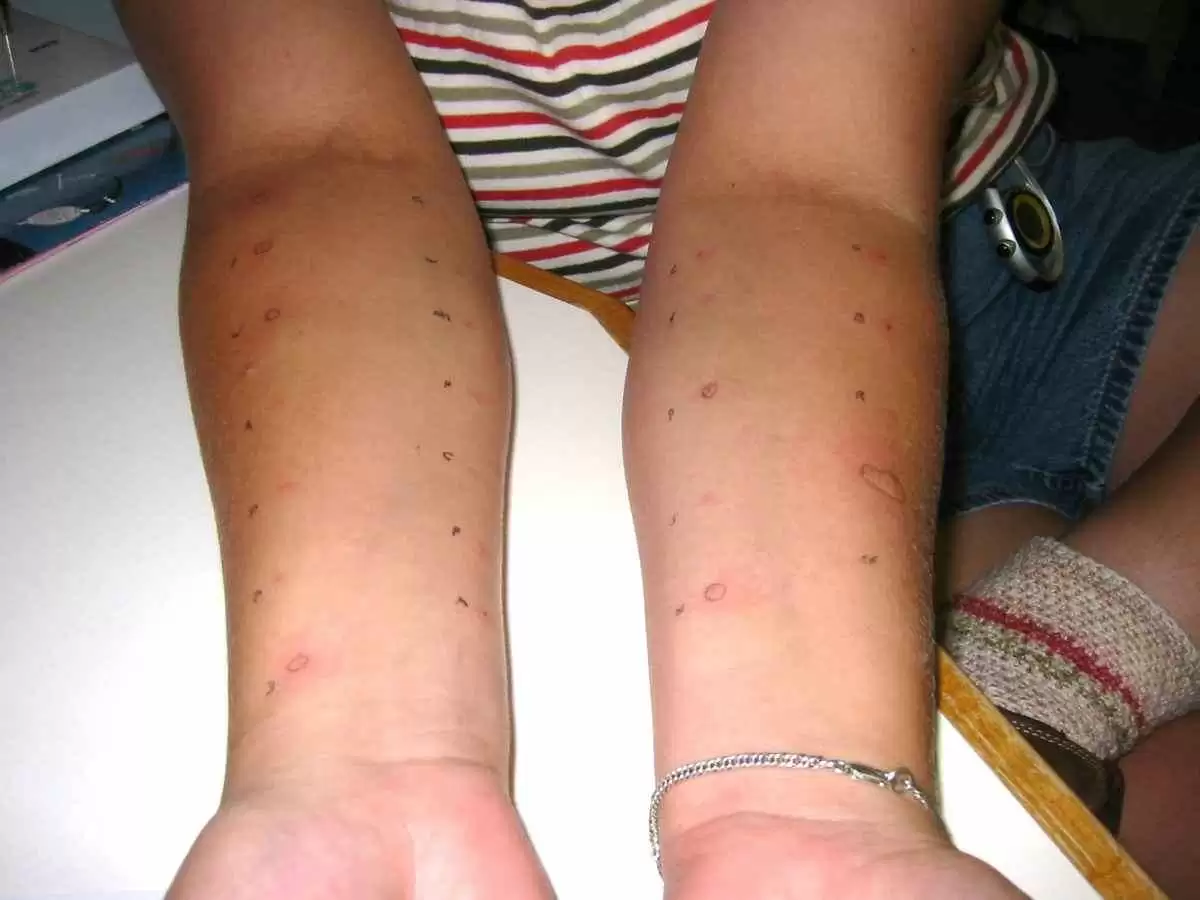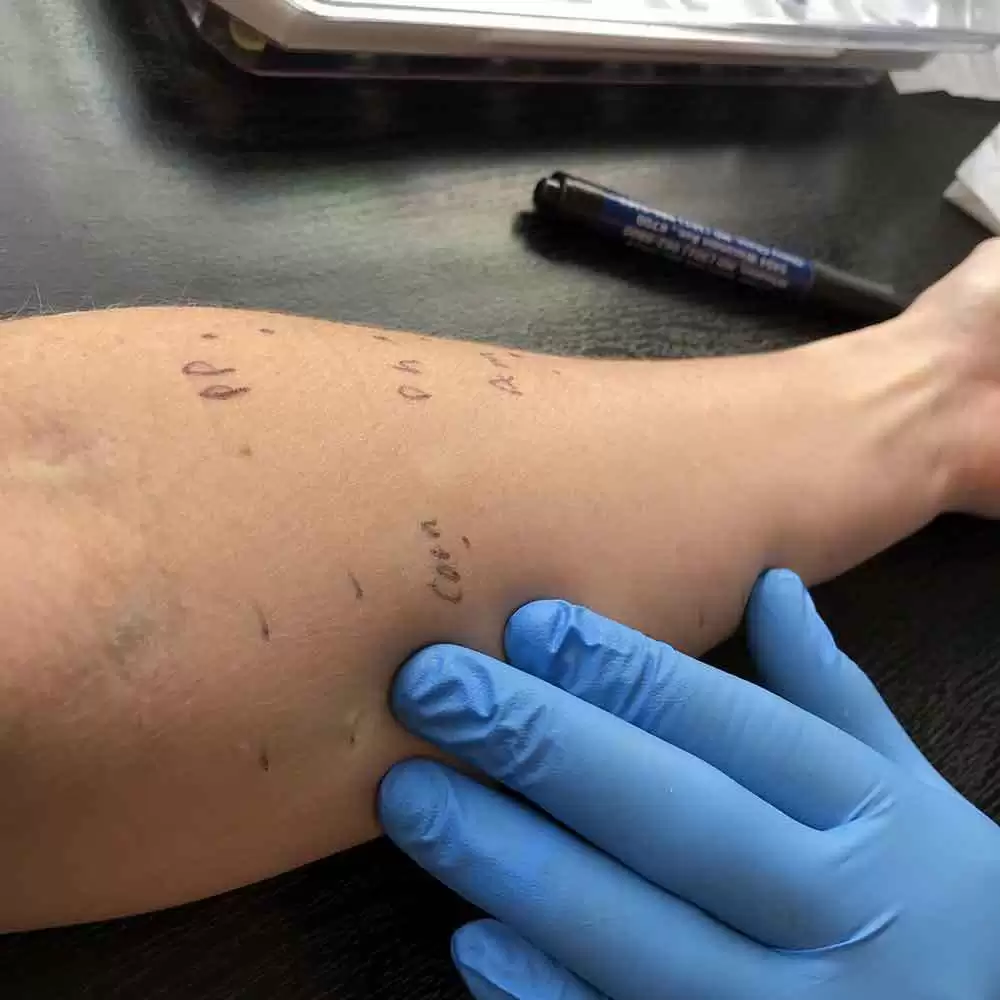-
Welcome to Celiac.com!
You have found your celiac tribe! Join us and ask questions in our forum, share your story, and connect with others.
-
Celiac.com Sponsor (A1):
Celiac.com Sponsor (A1-M):
-
Get Celiac.com Updates:Support Celiac.com!
Search the Community
Showing results for tags 'food allergy'.
-
Does any one know how long it will be until the dairy issue going to go away after being gluten free? I feel better but doing as my dietician says and trying to reintroduce proper dairy is causing a lot of issues. Hello I’m new but I thought I’d ask here i am currently gluten free after said celiac diagnosis and have been for 7 months I do feel better I was almost in the hospital which is how bad it got until people started to listen to me. Previously I was dairy free for only a month but have been lactose intolerant for atleast a decade. Because I suffer from a bowel disease I have a dietitian who now tells me to try full dairy again by reintroducing it because “gluten is the issue” however I have tried repeatedly to do this but when i try I causes massive bowel problems, pain and so. More info: (I can’t take soya milk since that brought me up in rash I also can’t seem to tolerate milk. However some foods with little soy or dairy allows me to have small solid rather than D) TiA X
-
Ten Natural Approaches to Treating Food Allergy
John Kernohan posted an article in Spring 2005 Issue
Celiac.com 03/03/2022 - When it comes to food allergy, there are basically two types: Immediate Food Allergy (Classic, Immediate-Onset, IgE-Mediated) This is the most understood, but least-occurring immune response to foods. It only occurs in less than 2-3% of adults and less than 5% of children. The reaction time is anywhere from seconds to up to 2 hours and typically affects the skin, airways or the digestive system. The most commonly known response is anaphylaxis, which can result in death. This type of food allergy is typically tested in a doctor’s office by means of a skin “scratch” test. Additionally, it only takes a single food to cause such a reaction and it is typically a food that is rarely eaten. Hidden Food Allergy (Food Intolerance, Delayed-Onset, IgG-Mediated) This is the lesser understood, but most common immune response to foods. It occurs in anywhere from 45-60% of the general population and affects children and adults equally. The reaction time occurs anywhere from a couple of hours up to 2-3 days after consumption of the food. Any system, tissue and organ in the body can be affected, and there are over 118 medical conditions/symptoms that are either caused and/or provoked by this type of allergic response to foods including, but not limited to, arthritis, weight gain, fatigue, high blood pressure, arthritis, Celiac Disease, sinus conditions, asthma and various digestive disorders. Conventional skin “scratch” testing is incapable of detecting this type of food allergy. Even more intriguing is that both a single food and a combination of foods can cause a reaction and it is usually with foods that are regularly eaten. Conventional therapies for treating food allergy commonly include immune suppressing drugs such as steroids and anti-histamines, but there are a number of therapies that are less harmful to the body and in many cases are just as effective, which include: Food Allergen Elimination and Rotation Diet: Though many adults can self-identify their or their children’s IgE-mediated (immediate-onset) allergic foods, it is not unusual for them to be unable to identify IgG-mediated (delayed-onset) allergic foods. Due to advancements in the laboratory analysis of food allergies in recent history, a simple and convenient finger-stick test is available for identifying the culprit foods behind one’s ill-health. This test can be done in either a physician’s office or in the comfort of one’s own home. Once the offending foods have been identified, a strict avoidance of allergic foods is the key to any food allergy treatment protocol. Eliminating the allergic foods will be the single most effective thing one can do to end the suffering they experience due to food-induced illnesses, and it will also help correct malnutrition and leaky gut syndrome. The next most important thing one can do to treat their food allergy is to go on what is know as a rotation diet. A rotation diet helps prevent the development of new food allergies and encourages a more balanced, unprocessed and varied diet. It also leads to weight loss and helps eliminate food cravings that are caused by chemical mediators being released in the body by allergic reactions to foods. Quercetin Bioflavanoid: Quercetin is a plant bioflavanoid that is naturally found in such things as apples, cherries, wine, tea, red and yellow onions, and chives. It has been found to help stabilize mast cells in allergic patients and is a very strong antioxidant and anti-inflammatory agent. Glutamine: Glutamine is one of the most abundant amino acids in the body. It “feeds” the immune system and small intestinal mucosa and is critical for maintaining optimal levels of certain detoxifying antioxidant enzymes such as glutathione peroxidase. When the body is stressed by food allergies and conditions such as Celiac Disease, Crohn’s Diseases and ulcerative colitis, glutamine is unable to do its job of maintaining a healthy immune system and intestinal lining. Glutamine increases the release of growth hormones, restores the digestive tract and maintains a healthy immune system. It also increases the liver’s and lymph nodes’ production of glutathione, which helps the body clear itself of food allergic antibody immune complexes. Glutamine also reverses low nutrient levels in food allergic patients suffering from malabsorption. MSM: Methylsulfonylmethane (MSM) is a natural component of the plants and animals we eat and is normally found in breast milk. MSM has been found to alleviate allergic responses to both foods and airborne inhalants such as pollen. It can provide relief to those who suffer from migraines and has been reported to offer long-term pain relief for those with rheumatoid arthritis. MSM aids in reversing constipation, acne, rosacea and snoring (all which have been associated with food allergy). There is a concern about contaminants in some MSM products. For instance, left over DMSO can cause an allergy in and of itself. Use only MSM products containing a distilled form, such as OptiMSM. Omega 3 Fatty Oils: Omega-3 oils, which can be found in fish such as salmon, halibut, haddock, flounder, cod, trout and red snapper, help in overriding the body’s ability to over-produce inflammatory prostaglandins and leukotrienes, which make the body more prone to allergies and inflammation. Vitamin A: Vitamin A is an important immune system building vitamin. It helps prevent skin conditions such as eczema and psoriasis. It aids in maintaining a healthy thymus gland and helps prevent the release of inflammatory prostaglandin during allergic reactions. Vitamin C - Vitamin C has long been regarded as a natural antihistamine. It also stimulates phagocytes, which is a white blood cell that attacks food allergens and various viruses and bacteria. Breast Feeding: Breastfeeding improves promotes healthy probiotic bacteria in the intestines and passes protective antibodies and nutrients from the mother to the infant, which protects against allergies and other ill-health conditions. Those who are breast-fed have been shown to have a lower incidence of otitis media, eczema, asthma, diarrhea and insulin-dependent diabetes. Exercise: Exercise improves circulation, enhances digestion, stimulates the immune system, and accelerates detoxification—all which aid in reversing and preventing food allergy. Elimination: Eliminating some of the initial causes a food allergy is always important for both treatment and prevention. People tend to develop delayed onset food allergies during antibiotic treatment or when taking anti-inflammatory drugs or acid blocking drugs for prolonged periods of time. -
Celiac.com 12/17/2021 - Gastro-esophageal reflux disease, or GERD, is the focus of considerable medical attention at the moment. This very old problem has gotten some new attention as it has recently been recognized as a significant factor in some pulmonary diseases(1) and esophageal malignancies(2). While some sufferers have few or no symptoms of reflux disease, most of us feel at least some degree of discomfort when a mixture of food particles and stomach acids are pushed back up the esophagus where there is less protection from harsh stomach acid. The protection diminishes the further up the esophagus the acid rises as there is some mucous produced in the lower reaches of the esophagus nearer the stomach. The unprotected tissues further up the esophagus are burned, often causing pain, and sometimes, permanent damage(2). We need only turn on our television sets to see the frequent and expensive advertising campaigns for the various products available to treat this widespread problem of indigestion and heartburn. If you regularly experience heartburn or indigestion, you may take one of the many drugs that are often prescribed to reduce production of stomach acid. Or you may just take one or more of the over-the-counter remedies such as Tums, Gaviscon, Rolaids, Mylanta, etc. But all of these products, whether prescribed or not, simply mask the symptoms of GERD without addressing the underlying cause. Many of us who have gluten-induced disease have experienced some degree of relief from GERD symptoms after beginning a gluten-free diet. Prior to my diagnosis of celiac disease, I not only took prescription medications in a vain attempt to control the acidity in my stomach and throat, I also ate a huge quantity of Tums and/or Rolaids every day, all day long. The lucky ones among us experience complete, long-lasting relief from indigestion and heartburn. For those of us who aren’t so lucky, the problem may be caused by one or more of several factors such as smoking, excessive alcohol consumption, or allergic reactions to the foods we are eating. If you struggle with excess acid production and/or esophageal reflux, it may be the result of your immune system reacting to the contents of your stomach. When such immune reactions are mounted, histamine is released into the stomach which triggers excessive secretion of gastric acid. If there isn’t enough food in the stomach to absorb the acid produced, we begin to feel uncomfortable. We may eat more food to get temporary relief or we may take one or more of the remedies listed above. Weight gain and obesity are predictable results of eating more and more to control stomach acid production. Prescription and non-prescription anti-acid strategies pose a host of other health problems—from inducing vitamin deficiencies— to compromising the immune protection provided by stomach acids. Whatever we choose, GERD is likely to continue until we address the underlying problem by eliminating allergenic foods from our diet. The first step in this elimination process is to identify the foods that are triggering an immune response. There are simple, convenient IgG antibody blood tests available to help identify the specific foods that are causing your discomfort. If you are following a gluten-free diet and you continue to experience GERD, you may benefit from this testing. However, if you have been free of gluten for more than a few months, you should not expect these tests to identify any of the gluten grains (Also, such negative results should not be taken to imply that it is safe to return to eating gluten). Once the allergenic foods have been identified, they should be strictly removed from your diet for at least six months. You can try re-introducing the offending foods after that time, but some immune reactions may last many years. Even six years after my own IgG food allergy testing, I must still avoid eggs, dairy proteins, and several other foods that were identified back then. The lab that did my testing (Immuno Labs, Ft. Lauderdale) provided information on the strength of the immune reaction to each allergenic food. From weak to strong, the reactions were numbered +1 to + 4. This has been very helpful because I was able to re-introduce most of the foods marked +1 and +2 after about six months. Whether you follow a gluten-free diet or not, if you are experiencing heartburn and/ or indigestion, food allergy testing may be just what you need. It has proven very helpful to my family and me. References: Katz PO. Gastroesophageal reflux disease and extraesophageal disease. Rev Gastroenterol Disord. 2005;5 Suppl 2:31-8. Suzuki H, Iijima K, Scobie G, Fyfe V, McColl KE. Nitrate and nitrosative chemistry within Barrett’s oesophagus during acid reflux. Gut. 2005 Nov;54(11):1527-35.
- 2 comments
-
- esophagus
- food allergy
- (and 8 more)
-
Celiac.com 05/21/2021 - If you're like most people with celiac disease or gluten sensitivity, you probably went through quite an ordeal to figure out that gluten was the cause of many of your health issues. In most cases, including mine, it can take years to figure this out, and those are years you've lost to poor health which you can never get back. For most people with gluten sensitivities a strict gluten-free diet, usually for at least a year or two, will resolve most issues caused by gluten, but this is not true for everyone. In my case it took about two years to really feel good again, and I also had to exclude other foods like corn, cow's milk (casein), chicken eggs, tomatoes, and garlic, even though they are gluten-free, and considered safe for a gluten-free diet. At the 2-3 year point I felt so much better that I began adding back everything into my diet except for gluten, and it seemed that those items no longer bothered me. Fast forward 25 years and I now realize that I've been having issues again with feeling bloated after I eat, which is accompanied by a growing waistline that isn't necessarily made up of fat, but seems more like inflammation in my intestines, similar to what I experienced when I was eating gluten, but not nearly as bad. I've rechecked my gluten antibody levels, and it doesn't seem to be related to hidden gluten in my diet. I'm not alone here, and it turns out that many celiacs will not make a full recovery without taking more steps than just a gluten-free diet. To try to figure out what was going with me I decided to take an offer that I couldn't resist: One of the advertisers on Celiac.com, Roger Deutsch of PreviMedica, offered to give me a free ALCAT food sensitivity test panel in return for me writing this article about my experience (PreviMedica also offers a celiac test, included with their celiac, IBS, Crohn's array). The ALCAT test analyzes the white blood cell (leukocytes) responses to blood that is incubated with extracts of foods, molds, chemicals/food additives, antibiotics and preservatives, and the company claims that this process can identify food intolerance issues that can trigger inflammation in sensitive individuals. If you do some Google searches on the test you may find that it's been shown in research to help some people lose weight, and research has also shown that it may provide clinical improvement in those with IBS. While searching you may also find criticism of the ALCAT test, including claims that ALCAT test results are not consistent or replicable, which I brought up with Roger, and to which he responded: “Those statements are propaganda from a competitor. The test reproduces nicely...see independent studies from reputable institutions.” After sorting thought all this I decided that it was worth it for me to pursue ALCAT testing, in the hope that I could finally track down foods that might still be causing me issues. Soon after my conversation with Roger I got a call from a blood draw company who makes house calls, and we scheduled a time for them to come by. The person showed up at my house on time, was very professional, and painlessly took the samples needed for the ALCAT testing. I got my results back around a week or two later, and to summarize them I ended up with 4 “severe” reactions to different foods that I should strictly avoid for at least 6 months, 23 “moderate” reactions to different foods that I should avoid for 3-6 months, and 66 “mild” reactions to different foods that I should only include in my diet on a 4 day rotational basis, unless the foods are items that I consume often, and if so, I should also exclude those items for an initial 3 month period. At this point I must bring up a common criticism that I've seen regarding food allergy testing—that you're often faced with a daunting list of items that might trigger reactions, and avoiding all of those foods could be very difficult. The good news in my case was that the 4 items on my “severe” list, apple, red palm fruit, yam, and zucchini, are all things that were easy for me to avoid, as I've never been a big apple, yam or zucchini fan, and have never, as far as I know, even tried red palm fruit. However, several items on my “moderate” list were definitely a shock to me, and included items that would be very difficult from me to avoid, including: rice (white and brown), coffee, garlic, mustard seed, turmeric, almond, avocado, beef, pork, and casein (both cow's and goat's milk). Several of these foods are daily staples, including coffee, without which Celiac.com might not even exist! Yes, I'm a java junkie, so seeing coffee on this list was a serious and unexpected blow. For the next four weeks I went all in, and successfully modified my diet to meet the new requirements of my ALCAT test results. The first thing I noticed was that I lost some weight, and, as it turns out weight loss is common when going on an ALCAT diet. I also noticed that my abdomen seemed to shrink, and it didn't seem to correlate directly to the relatively small amount of weight that I lost, so I believe that this part was directly related to a decrease in intestinal inflammation. During the time I was on the diet I felt better than ever, but I also found that staying on the diet did not get any easier for me. In my case it was due to the fact that my wife does most of the meal preparation in our home, and given the fact that she's from Taiwan, my asking her to exclude things like rice, garlic, pork, and other key ingredients used in Asian cooking was pretty difficult for her, and she was not about to adopt my new diet. I also never really got used to living without coffee, and that was the first thing that caused me to waiver from the diet. After breaking down and adding coffee back into my daily routine, a few other things crept back in, mainly because my wife continued making some outstanding dishes that I found increasingly hard to refuse (ok, I blame myself here...there are no two ways around it!). I was on my customized ALCAT diet for long enough to realize that it definitely had a positive effect on my weight, inflammation level, and overall feeling of well-being, but I also realized that one of the main criticisms I heard about food test results was true: excluding large numbers of foods is indeed hard to deal with. In this case the shortcomings were entirely mine, especially because the folks at PreviMedica had contacted me during the time I was on the diet to offer any assistance, including dietary counseling, which I declined. At this point I've not given up on the ALCAT diet, and am trying to plan a better time for me to begin attempt number two. I've never smoked cigarettes, but have seen others quit them and know that it can often take several attempts to be successful. Perhaps the second or third time I try the ALCAT diet will be the charm? I also want to share some questions I had for Roger during the course of writing this article, along with his, and his colleague's responses, which are below: Q: During the late 1980's I had RAST (radio-allergo Sorbent Test) serum allergy testing done, and was told by my allergist (Rudolf Kallenbach, MD) not to eat several foods daily, including wheat, and to only eat them once per week at most. I ignored this, and around 5 years later ended up with full blown celiac disease. I still wonder if I could have avoided celiac disease by following my doctor's orders. What do you think? A: If you are HLA DQ 2.5 and 8 homozygous or even heterozygous positive for one or both alleles you should have avoided wheat altogether. If you had avoided wheat and other gluten containing grains it is almost certain that you would have avoided developing celiac disease. Q: My original RAST test results were very different from the ALCAT results. In brief, how does the RAST test compare with your ALCAT test, and which one is more accurate for food sensitivities or allergies? A: The difference is that the RAST measures the levels of serum IgE antibodies and the ALCAT Test measures the response of an ex vivo (outside the body but analyzing live blood tissue) challenge with a food on the part of the innate immune cells. They are intended for different things. The RAST is quite a good guide for what is called, classical or Type 1 allergy; the ALCAT Test is excellent for determining non-IgE mediated allergy, or, sensitivity. These are different branches of the immune system and they present quite differently. IgE allergy produces rapid and pronounced symptoms, maybe even anaphylaxis say to peanut or crustacean. Food sensitivities maybe delayed for hour, even days, and symptoms are more chronic and less acute. The ALCAT Test, for example will tell you if you have a response to a naturally occurring food toxin (all plants produce toxins to protect from pests) and these can produce a wide range of symptoms that can effect any target organ or tissue in the body. Please see The Right Stuff: Use of Alcat Testing to Determine Dietary Factors Affecting Immune Balance, Health, and Longevity, as this paper explains the differences in greater detail. Q: My results indicated that I have a moderate reaction to casein, as well as to egg yolk. The results don't differentiate between cow's milk, goat's milk, or sheep's milk, nor do they differentiate between chicken eggs or duck eggs (shortly after my celiac disease diagnosis I could not tolerate casein or chicken eggs, but could tolerate goat's and sheep's milk, as well as duck eggs). Can you explain why your test seems to not differentiate between these items? A: The eggs that are tested in the ALCAT Test are chicken eggs. When following the results and avoiding reactive foods, we recommend not consuming any foods that were untested. Therefore, we would recommend the avoidance of duck eggs. The proteins, casein and whey, are in goat’s, cow’s, and sheep’s milk, although the forms are somewhat different. The ALCAT Test tests one form of casein (which contains both A1 beta casein and some A2 beta casein) and when reactive will eliminate cow’s milk, goat’s milk, and sheep’s milk since they all contain casein. The ALCAT Test does test directly for the reactivity to cow’s milk, goat’s milk, and sheep’s milk as well. Q: As mentioned, I have celiac disease, so I've been gluten-free for over 25 years now. My test results show that I don't have a reaction to gliadin, the part of wheat that is responsible for the autoimmune reaction seen in celiac disease, and a mild reaction to gluten. Can you explain why I seem to not react to gliadin, and why your test differentiates between gluten and gliadin reactions? A: The ALCAT Test is testing the white blood cell response, not the antibodies to tissue transglutaminase or deamidated gliadin peptide which would be the response indicating an active celiac process, as you know. When individuals react to gluten and/or gliadin in the ALCAT Test, a sensitivity to the gluten and/or gliadin, not celiac disease, is indicated. When individuals with celiac disease do not react to gluten/gliadin in the ALCAT Test, this does not mean it can be safely consumed. Q: Two items that I was surprised to see in my "Moderate" reaction list were white and brown rice, which have been daily staples and are in many gluten-free foods that I eat. I've never noticed any issues when I eat rice. Likewise, apples are in my "Severe" list, but I don't eat them often. Can you explain why some foods that I seem to have severe or moderate reactions to don't have noticeable effects after I eat them? A: Keep in mind that the white blood cell reactivity (change in number and size) the ALCAT Test identifies, is an inflammatory response. (see scientific dossier attached page 4) Inflammation is the contributing factor to the most common chronic health problems we experience in the US. We don’t always feel inflammation but it is happening whether we feel it or not. IF symptoms are noticed from sensitivities, they can be noticed ~2-3 hours after ingesting the offending food or the next day or even 4 days later. (unlike the allergy response symptoms which would be noticed minutes after ingesting the offender up to 2 hours later). Q: My experience so far, after being only a week and a half into my dietary changes, are that the ALCAT test results can be overwhelming. They can cause many people to have to make huge dietary changes, and have to spend a lot of time shopping, planning and preparing each meal. Is this feeling pretty common among those who get your test results, and do you have any advice for me? A: Feeling overwhelmed is very common when seeing the results. That’s why we do what we do in PreviMedica- every test comes with ½ hour complimentary review of the results to explain how to implement the results. More in depth nutrition therapy and individualization is offered when patients choose to work with us in PreviMedica Nutrition for individual nutrition sessions or monthly memberships. We also provide customized meal planning tools and Sensitivity Friendly Menus for patients. DISCLOSURE: For writing this article I received a complimentary "474 Items Previ Premium" ALCAT food sensitivity test panel from PreviMedica with a retail value of $1,115.00.
- 7 comments
-
Celiac.com 03/24/2020 - Many of us have experienced unpleasant symptoms after a meal or snack. The effects might range from mild itching of the mouth, to nausea, or other symptoms, including sneezing, wheezing, skin rash, joint pain, bloating, diarrhea, and more. So is the problem a food allergy, an intolerance, or a sensitivity, and what is the difference? It's not uncommon for people with food sensitivities or intolerances, or even celiac disease, to think they have food allergies. In fact, "food allergy" is a fairly common term that can mean any of these conditions, depending on who is doing the talking. In reality, though, food allergies are more rare and usually more serious than food intolerances or sensitivities. True allergic reactions to foods can range from merely inconvenient to life-threatening. Differences Between Food Allergies, Food Intolerances, and Food Sensitivities Food Intolerances Food intolerance basically means that the body is unable to process or digest certain foods. Food intolerances are very common, and are usually less serious than food sensitivities or food allergies. Lactose intolerance is one of the most common food intolerances. Lactose intolerance happens when people guts don't produce enough of the enzyme lactase to break down the lactose. Lactose intolerance can be inherited, or it can simply happen as some people age and produce less lactase. Research data shows that only about one in three people worldwide can digest lactose past the age of seven or eight. Interestingly, most celiacs with lactose intolerance recover on a gluten-free diet. Once the damaged villi and microvilli to grow back, and the gut heals, the sensitivity to lactose often disappears. This can take time. In most people, full gut healing takes between six months and a year, but it can take up to two years or more. Also, most people who are lactose intolerant can consume goat and sheep cheeses, such as feta or pecorino Romano, without any problems. Some can consume goat or sheep's milk products with no issues. Many people with lactose intolerance can also consume raw, unpasteurized dairy from cows without symptoms. Links to Goat, Sheep, and Raw Cow Milk Products Goat Milk Products Sheep Milk Products Raw Cow Milk Products Lactose intolerance is not a serious medical condition, but symptoms can be quite uncomfortable. Simply avoiding milk and dairy products is the easiest way to avoid symptoms, but over-the-counter lactase enzyme supplements can be helpful for those who wish to consume dairy. Food Sensitivities Food sensitivities are common, and are usually include more serious or debilitating symptoms than food intolerances. Food sensitivities happen when people experience symptoms after eating certain foods. Symptoms are not life-threatening, but can be serious. Symptoms of food sensitivities include joint pain, stomach pain, fatigue, rashes, and brain fog. Gluten is probably the best-known trigger of food sensitivities. When people with celiac disease or certain other medical conditions eat wheat, they provide an immune reaction in the gut that can cause long-term health consequences if left untreated. Researchers currently believe that food sensitivities are the result of an immune reaction that generates a wide rage of symptoms. Food sensitivities can strike at any time, and they can also vanish, sometimes with no apparent explanation. People avoiding certain foods due to sensitivities may want to try small amounts of the food from time to time to see if the situation has changed. Elimination Diet Helps Spot Food Sensitivities The best way to spot food sensitivities is through careful observation and elimination. Removing potential food allergens from the diet for two to four weeks, reintroducing them one at a time, and watching for symptoms is the best way to figure out which food or foods is causing the reaction. Once you've narrowed it down, avoiding the foods that trigger sensitivities can improve both symptoms and quality of life. Food Allergies True food allergies are the body's most serious reaction to food. Food allergies happen when the immune system reacts to certain foods. For example, people with peanut or shellfish allergies can suffer from symptoms including serious difficulty breathing and low blood pressure following exposure to peanuts or seafood. These symptoms can sometimes be fatal. Many people with food allergies carry an epinephrine shot device, such as an Epic-Pen, as a precaution against such episodes. These pens can save lives. Sometimes people have food allergies from very early in life, but they can strike at any time during life, even in old age. If any food causes you to have true allergic reactions, such as significant rashes, dizziness, swelling of the face, or difficulty breathing, it is wise to consider a visit to the doctor for allergy testing and treatment. Celiac Disease Celiac disease is an autoimmune condition that affects about 1% of the Western population. Celiac disease results from a complex inflammatory reaction triggered by gluten consumption in genetically predisposed people. Celiac disease is not a food allergy. Eating gluten a few times does not cause an immediate life-threatening problem. However, when people with celiac disease eat gluten, they often suffer nausea, vomiting, and other symptoms in the short term. Over time, if left untreated, gluten consumption can cause diarrhea, weight loss, and malnutrition, and can lead to many other associated conditions, including certain deadly types of cancer. Avoiding gluten is the only effective treatment for celiac disease. Gluten is found in a variety of grains, including wheat, rye, barley, and in wheat types like kamut, spelt, semolina, bulgur, farro, emmer, einkorn, and farina. Many processed foods also contain gluten in the form of wheat flour. Also, cross-contamination from gluten-containing food is a constant threat, especially when eating out. Conclusion So, food allergies come with strong physical symptoms, such as itching, face swelling, and difficulty breathing. Food allergies can be serious, and even life-threatening, while food intolerances and sensitivities are usually just unpleasant and inconvenient, but some can have long term health consequences. Once you’ve identified the food or foods that trigger your allergy, sensitivity, or intolerance, a nutritionist or a physician can help devise a diet that is safe and nutritious. In the case of allergies, they can also provide you with tools, such as an epinephrine injection, and a plan of attack should a life-threatening reaction occur. Though food intolerances and sensitivities are not unusual, they can be challenging to figure out. Even with an active elimination diet, finding out which foods trigger reactions can be challenging, and time consuming. Ultimately though, tracking down the cause of food intolerances and sensitivities is rewarding, and usually leads to better health and well-being. Resources for Food Allergy, Intolerance, and Sensitivity Mayo Clinic - Food allergy vs. food intolerance: What's the difference? Cleveland Clinic - Allergy or Intolerance: How Can You Tell the Difference? Harvard Medical School - Food allergy, intolerance, or sensitivity: What’s the difference, and why does it matter?
-
Celiac.com 04/24/2019 - Daily Show host Trevor Noah tried to have a bit of fun with the results of a study that appeared in JAMA in January. Unfortunately, the usually agile Noah missed the mark, because his jokes were based on a misreading of the study's conclusions. Now, we all love a good comedy bit, and we've grown to expect a little fun at the expense of gluten-free dieters, especially celebrities or fad followers. In the study of 40,000 American adults, about 20 percent reported a food allergy. After eliminating patients not diagnosed by a doctor, or lacking severe allergic symptoms, such as difficulty breathing and swallowing, researchers estimated that only about 11 percent of those surveyed have a “true allergy.” Again, that's the basis for the comedy, that 10 percent of Americans are overreacting, and avoiding certain foods unnecessarily. “Allergies: they affect the lives of many b%$@#-ass Americans,” went Noah's set up. “But according to a new study, the most common affliction is hypochondria.” Now, Noah can be forgiven, because it's easy to read the study that way. But it's also wrong, because it misses an important distinction: the difference between a food allergy and a food sensitivity. Many people don't know the difference, which is explained here. Many people use the word allergy to describe what are actually food sensitivities. Food allergies are generally more serious, and include serious or possibly life threatening symptoms, like difficulty breathing and swallowing. Food sensitivities are generally not like threatening, though they may include unpleasant side effects like heartburn, nausea, upset stomach, gas, diarrhea, and headaches, among others. The point, of course, is that even food sensitivities can be serious. People avoid many foods for many reasons, including their own subjective levels of sensitivity. If foods don't agree with you, then it's wise to consider reducing or eliminating them from your diet. There's not much comedy in that fact, but it's good personal practice.
- 3 comments
-
- celiac
- celiac disease
-
(and 5 more)
Tagged with:
-
Celiac.com 04/25/2019 - In the last few years, we’ve run a bunch of stories about colleges and universities making big changes to their dining services to accommodate gluten-free students. College Students Hungry for Gluten-Free Meals But, for all of the improvements in the last few years, getting a gluten-free meal at a college campus can still be a challenge. At too many colleges, students still struggle to find easy, reliable, nutritious gluten-free meals, even though research shows that students are hungry for gluten-free meals. Celiac Students Push for Gluten-Free Food In some cases, students with food allergies feel they are being treated like second-class citizens. A number of prominent legal challenges have resulted in agreements by some colleges to improve their food offerings for students with food allergies and gluten intolerance. A number of universities have been forced to settle claims brought under the Americans with Disabilities Act (ADA), including Lesley University, and Rider University. UCLA is the latest college to come under fire. A recent complaint alleges that many of UCLA Dining Services’ dishes contain gluten, and even those that do not are usually made in kitchens with gluten contaminants, making cross contamination likely. UCLA Dining Services says that the school’s gluten-free pantries contain toasters, microwaves and certified gluten-free dishes. Onerous Rules for Gluten-Free Students Gluten-free students say the dining halls provide allergen information, and note which foods contain wheat, but they lack comprehensive gluten information. They also enforce arcane rules that make gluten-free students jump through hoops. For example, before students can access the gluten-free pantries in De Neve dining hall and Bruin Plate, they must contact the Center for Accessible Education and fill out an extensive form. The basic complaint goes like this: By offering unequal access to high-quality campus food, UCLA is discriminating against students with gluten intolerance and celiac disease. As it stands, these students pay the same fees for others do for a meal plan, but they get unequal options. Additional information about the ADA can be found at
-
- celiac disease
- college
-
(and 7 more)
Tagged with:
-
Celiac.com 03/20/2019 - Sensitivities to gluten are becoming more common. Patients with celiac disease have wheat-specific immune responses, but researchers have remained uncertain about the potential role of non-wheat proteins in triggering symptoms in celiac or gluten-sensitive patients. A team of researchers recently set out to assess the role of non-gluten proteins that may trigger symptoms in celiac or gluten-sensitive patients. Specifically, the team wanted to determine if lactobacillus degrades and/or reduces the inflammatory effects of amylase trypsin inhibitors (ATI). The research team included Alberto Caminero, Justin L. McCarville, Victor F. Zevallos, Marc Pigrau, Xuechen B. Yu, Jennifer Jury, Heather J. Galipeau, Alexandra V. Clarizio, Javier Casqueiro, Joseph A. Murray, Stephen M. Collins, Armin Alaedini, Premysl Bercik, Detlef Schuppan, and Elena F. Verdu. The researchers put mice on a gluten-free diet, with or without wheat amylase trypsin inhibitors (ATI), for one week. Mice included a control group of C57BL/6 mice, and groups of Myd88–/–, Ticam1–/–, and Il15–/– mice. The team then collected small intestine tissues and measured intestinal intraepithelial lymphocytes (IELs). They also looked at gut permeability and intestinal transit times. Control mice fed ATI for one week were fed daily with Lactobacillus strains with either high or low ATI-degrading capacity. The team sensitized NOD/DQ8 mice to gluten, and then fed them an ATI diet, a gluten-containing diet or a diet with ATI and gluten for two weeks. Mice were also treated with Lactobacillus strains that had high or low ATI-degrading capacity. The team took samples of intestinal tissues, and measured IELs, gene expression, gut permeability and intestinal microbiota profiles. Intestinal tissues from control mice show that ATI triggered an innate immune response by activating TLR4 signaling to MD2 and CD14, and impaired barrier function even in the absence of mucosal damage. Gluten-sensitized mice carrying HLA-DQ8 showed increased intestinal inflammation in response to dietary gluten. The team found that lactobacillus degraded and reduced the inflammatory effects of ATI. In conclusion, amylase trypsin inhibitors influence gluten-induced intestinal symptoms in wild-type mice and increase inflammation to gluten in genetically susceptible mice. Lactobacillus degrades and reduces the inflammatory effects of ATI. Strategies to alter the gut microbiome, such as the ingestion of bacteria that can degrade and reduce ATI, may be helpful for people with various wheat-sensitivities, including celiac disease. Read more at Gastroenterology The researchers are variously affiliated with the Farncombe Family Digestive Health Research Institute, McMaster University, Hamilton, Ontario, Canada; the Research Center for Immunotherapy, University Medical Center, Johannes Gutenberg University, Mainz, Germany; Institute of Translational Immunology, University Medical Center, Johannes Gutenberg University Mainz, Mainz, Germany; the Department of Medicine, Columbia University, New York, NY, USA; the Institute of Human Nutrition, Columbia University, New York, NY, USA; the Department of Microbiology. Universidad de Leon, Leon, Spain Division of Gastroenterology and Hepatology, Department of Immunology, Mayo Clinic College of Medicine, Rochester, Minnesota; the Research Center for Immunotherapy, University Medical Center, Johannes Gutenberg University, Mainz, Germany; Institute of Translational Immunology, University Medical Center, Johannes Gutenberg University Mainz, Mainz, Germany; and the Division of Gastroenterology, Beth Israel Deaconess Medical Center, Harvard Medical School, Boston, MA, USA.
- 1 comment
-
- celiac disease
- food allergy
-
(and 5 more)
Tagged with:
-
Celiac.com 03/19/2019 - For anyone with food allergies, finding safe, reliable allergen-free food is not just important, it’s critical. That’s especially true when eating out. According to Food Allergy Research & Education, researchers estimate that up to 15 million Americans have food allergies, including nearly six million children and teens. On average, food allergies send an American to the emergency room every three minutes. Now, a tiny company in Nashville, Tennessee is creating a certification process in an effort to promote celiac disease awareness and to provide a list of safe local restaurants for people who can’t eat gluten, or who have other food sensitivities. Allergy-Friendly.org was founded in 2018 by a local Nashville resident living with celiac disease. The company works to provide food-sensitive diners with safe restaurant options, and to ensure that restaurants understand and can meet the challenges of providing patrons with allergen-free meals. They also help to train employees on the preparation of allergy-safe meals for various food allergies. With the recent addition of BurgerUp Cool Springs, Allergy-Friendly.org has certified three restaurants in the Nashville area. The other two are Sunflower Cafe and Mangia Nashville. Though the company currently has no medical professionals associated with the certification process, it is in the process of forming a board, which will include medical professionals. The company plans to expand beyond Nashville. Find out more at Allergy-Friendly.org
-
- celiac
- celiac disease
-
(and 4 more)
Tagged with:
-
Celiac.com 02/06/2019 - People with celiac disease and gluten-sensitivities can have strong opinions on topics from testing and diagnosis to various aspects of the gluten-free diet. Combine that fact with an explosive rise in gluten-free dieting as a lifestyle choice, rather than medical necessity, and we’re just one celebrity Instagram from a three-alarm social media fire. The former model and Miss England, Danielle Lloyd is the latest celebrity to feel the fire from her social media audience. Lloyd’s offense, according to fans, was testing her seven-year old son Harry at home for food allergies, and putting him on a gluten-free diet based on the results. Lloyd’s Instagram posts touted the results of the home food allergen tests and her decision to make her son eat gluten-free. In the post, the former Lloyd said in one post that she’s "starting the new year feeling great after finding out what was causing me bloating and pain after eating food, with @Lifelabtests at-home intolerance and allergy testing kit." The test kits, from Lifelabtesting.com, measure sensitivity to more than 40 common allergens, such as grains, eggs and meat. In another post, Lloyd adds that “The results were so good that my son Harry did a test, too, and since changing his diet to gluten free, he hasn’t been in any pain." Fans on her Instagram feed warned her of the possible dangers of cutting out entire food groups for young children. Home Allergy Tests are Just a Starting Point As numerous commenters pointed out, home allergy tests, including tests meant to detect food allergens, are just a starting point. If you get a positive result, please consult a doctor before making a major dietary change. Switching to a gluten-free diet before seeing a doctor can cause confusion in diagnosis, and may be unnecessary. Another commenter agreed, writing: "A child should not be put on a gluten-free diet unless prescribed by a specialist." The proliferation of home allergy test kits can be useful as a guideline for understanding your health, but it’s important to double check the results with a physician before making major health or dietary changes, especially for children.
- 3 comments
-
- allergy
- danielle lloyd
-
(and 3 more)
Tagged with:
-

More than One in Ten US Adults Has a Food Allergy
Jefferson Adams posted an article in Latest Research
Celiac.com 01/21/2019 - A population-based survey study of more than 40,000 adults in the United States shows that just over one in ten people had an allergy to at least one food at the time of the survey. However, the same study reveals that nearly 20% of adults believed themselves to have a food allergy. Half of the adults with food allergies reacted to at least one food, while nearly 40% reported at least one food allergy-related emergency room visit in their lifetime. According to the US FDA, the most common food allergens are milk, peanuts, eggs, fish, crustacean shellfish, soy, tree nuts and wheat. How common are food allergies among adults in the United States? How severe are the symptoms, on average? Researchers Seek Accurate Estimates of Adults with Food Allergies A team of researchers recently set out to provide accurate estimates of the national distribution, severity, and factors associated with adult food allergies. The research team included Ruchi S. Gupta, MD, MPH; Christopher M. Warren, BA; Bridget M. Smith, PhD; et al Jialing Jiang, BA; Jesse A. Blumenstock, BS; Matthew M. Davis, MD, MAPP; Robert P. Schleimer, PhD; and Kari C. Nadeau, MD, PhD There have been numerous studies on food allergies in children, but very little is known about food allergy in adults. Food Allergy Can Start in Adulthood The team’s results indicate that more than 10% of US adults, more than 26 million people in all, are allergic to at least one food. That means that food allergies are both common and severe among adults in the United States. Moreover, food allergies often begin in adulthood, rather than in childhood, as is commonly believed. The team calls for greater scrutiny of adults with suspected food allergies, including proper testing and consultation to make sure patients are avoiding the correct foods, and not unnecessarily avoiding foods that are okay for them to eat. Source: JAMA Netw Open. 2019;2(1):e185630. doi:10.1001/jamanetworkopen.2018.5630 The researchers are variously affiliated with the Institute for Public Health and Medicine, Northwestern University Feinberg School of Medicine, Chicago, Illinois; the Department of Pediatrics, Northwestern University Feinberg School of Medicine, Chicago, Illinois; Mary Ann & J. Milburn Smith Child Health Research, Outreach, and Advocacy Center, Ann & Robert H. Lurie Children’s Hospital, Chicago, Illinois; the Department of Medicine, Northwestern University Feinberg School of Medicine, Chicago, Illinois; the Department of Preventive Medicine, University of Southern California Keck School of Medicine, Los Angeles; the Center for Innovation for Complex Chronic Healthcare, Edward J. Hines Jr Veterans Affairs Hospital, Hines, Illinois; the Department of Medical Social Sciences, Northwestern University Feinberg School of Medicine, Chicago, Illinois; the Department of Preventive Medicine, Northwestern University Feinberg School of Medicine, Chicago, Illinois; and the Sean N. Parker Center for Allergy and Asthma Research, Stanford University School of Medicine in Stanford, California. -
Hello everyone, I just relaized that I need to get tested asap for Celiac Disease. I have the rash on my fingers, the gas, stomach pain from anything wheat and sugar related. even when eating a clear diet, I get symptoms. One thing That might be the culprit is this tea from Taiwan and china. I tutor a Chinese lady, that is always giving me exotic teas. When I go to her house she has 3 kinds of tea ready. Im curious.. Tea is a plant just like oats, wheat etc.. Has anyone else heard of green tea or Chinese tea causing symptoms? The Chinese can be very easily insulted so if I refuse to drink the tea when I go over there I might hurt her feelings.
- 7 replies
-
- coffee
- food allergy
-
(and 1 more)
Tagged with:
Celiac.com Sponsor (A8):
Celiac.com Sponsor (A8):
Celiac.com Sponsor (A8-M):
Celiac.com Sponsor (A8):
Celiac.com Sponsor (A8):
Celiac.com Sponsor (A8-M):













